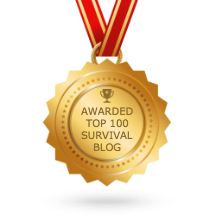Big One - see TEOTWAWKI. The "big one".
BOB - Bugout Bag. Used to store a supply of readily available supplies that you can grab at a moments notice if you need to leave your home in a hurry, as in right now!
Channelized Areas - In the case of an event where an entire city was to be evacuated, channelized areas are the most likely routes people would take; major roadways, railways, riverways, etc...
EMP - Electromagnetic Pulse. Capable of knocking out electronic equipment permanently.
Event - A catastrophe, big or small, that may require you to use some of the knowledge and supplies you have acquired through being a prepper. Green events last 1-10 days, yellow events last 10-90 days, and red events last 90 days to years in duration.
FEMA - Federal Emergency Management Agency. A Federal Government organization that responds to disasters. It usually takes FEMA a minimum of 72 hours to respond to a disaster emergency with the very basic of supplies (water and rations).
FIFO - First In First Out. A method of organizing perishable goods.
Golden Horde - The anticipated large horde of refugees and looters that will pour out of metropolitan regions when things like food, water, and civil order start to become non-existent.
G.O.O.D. - Get out of Dodge. Abbreviated slang term that describes the need to get out of town in a hurry.
GPS - Global positioning system.
Grid Down - An extended period of time when the power system is not available. (1989 Quebec power outage - small solar storm struck earth, lasted only 12 hours but knocked out power in the entire province of Quebec).
MRE - Meals Ready to Eat. U.S. military rations.
Prepper - A person who plans for the worse, but hopes for the best.
Retreat - A privately owned property where you can go in case your home becomes unsafe to reside within. A retreat in most cases is someplace away from large cities where you can find safety and survive on the basics such as hunting, foraging and farming.
TEOTWAWKI - The end of the world as we know it. Basically this is an event that spells the end of world society, including a large drop in the world's population and a massive loss of technical skills/knowledge. The entire world will never be the same as it was.
For more information on survival planning and preparedness, check out Biff Brannon's web page at http://www.survivalawareness.net.
Article Source: http://EzineArticles.com/6616481
The Prepper's Pocket Guide: 101 Easy Things You Can Do to Ready Your Home for a Disaster
120 Serving Breakfast Only @ $198 (120 Servings breakfast assortment. No entrees) - Order Now!






